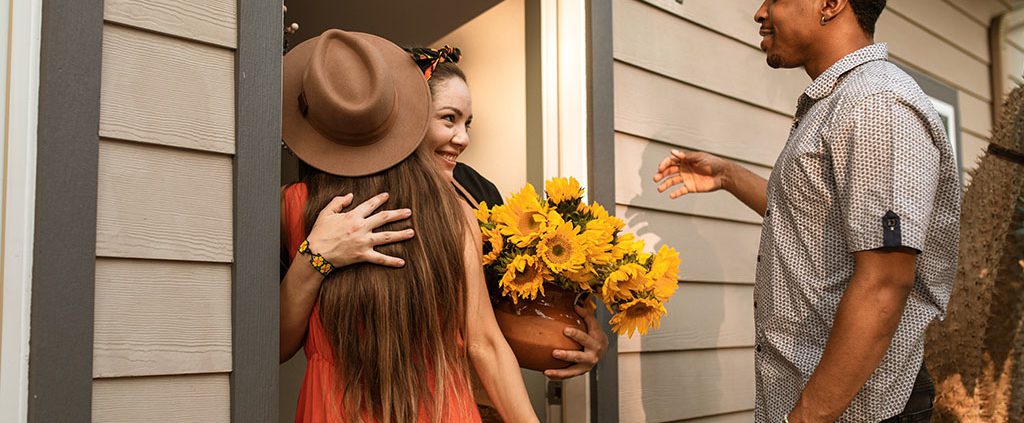How My Friends Showed Me the Gospel
Written by Amy Isham, Australia
Amy Isham is a librarian with a PhD in Leadership and has taught undergraduate social science. Amy works at City Bible Forum as their Marketing and Content Manager, and co-hosts CBF’s Deeper Questions podcast. She is married to Pastor Luke Isham at St Kilda Presbyterian Church, and has two beautiful kids, Evangeline and Solomon.
When I first started having conversations with Christians, I was a lapsed-Catholic-turned-New-Ager who practised reiki, kind of believed in reincarnation, and thought God was everywhere. My mum’s shelf of self-help books and crystals led me to the New Age movement, which felt kinder and more loving compared to the way I thought Christians acted, so I found myself there. My brother was also very much involved in the New Age movement, and we would talk about ideas of unconditional love with shining eyes.
My upbringing in a Catholic girls’ school had led me to think that “sin” was tied up to me being bad and unlovable, so the last thing I wanted to become was a Christian. Little did I know that God, through my Christian friends, was at work calling me back to Him.
It wasn’t my Christian friends’ eloquently put-together message of Jesus that drew me to God. They didn’t actually talk that much about what they believed. I don’t remember an explanation of penal substitutionary atonement (Jesus taking full punishment for the sins we deserve) or even any mention that my deeds were evil (even though they were).
However, what I do remember is their kindness and care for me as a person, which was so powerful that it eventually made me want to know more about their faith. They didn’t just say, “God is love”. They didn’t have to say anything. Their lives spoke it.
These three things they did spoke volumes to me:
1. They included me in a caring group and showed interest in me as a person
Often, in my New Age world, someone always wanted something from me. I was the “spiritual” one in some of my groups and that was the role I played. If I was in my reiki groups, my guru wanted me to listen and be amazed at his “wisdom” and “insight”. If I was around my other friends, they might only be interested in me if I was a potential girlfriend or had brought alcohol to the party.
But these Christians seemed interested in just who I was, in my value as a human being. They made me feel seen; they made me laugh and feel happy and safe.
2. They didn’t expect anything in return
They would offer to help without expecting anything from me. I’m grateful for all the time they spent walking or driving me home, involving me in conversations, buying me laksa when I had a cold.
One night, all my other non-Christian friends were hanging out at the shared house I lived in. It was a pretty chaotic and messy place (one time a stranger climbed through my window in the middle of the night and asked me for a glass of water). My Christian friends, who were at that same party that evening, offered to drive the other partygoers to the liquor store, instead of just sitting there and quietly judging the company I kept.
3. They shared the Bible’s truth kindly
Some time later, my cousin asked me to go to a baptism at a church near us. We sat through a sermon we both thought was foolish at the time, but a few weeks later, she got baptised, and I heard that same sermon again—this time alone.
I later asked to attend one of the Bible studies that they (the church my cousin got baptised in) ran, and it was on Romans. Romans 1 challenged me deeply on my not believing in God, lying, sexual immorality, and worshipping other gods (which clearly included my New Age beliefs).
When I first read it, I told myself it (I) wasn’t that bad, but it was very confronting to see how my behaviour wasn’t as good as I felt it was. My whole basis for life was to be “loving”, which was mainly about feelings. I found the Bible’s assessment of my life painful and a lot harder than just being a “loving” person.
But rather than making me feel bad for my sins, my friends simply challenged me to try and live like the Bible suggested, just for a week. When I came back after a week without even remembering to try, it was then that they explained to me that this was why we need Jesus—because we can’t live a good life without Him.
Good friendships lead to deeper conversations
I soon started seeking out my new friends during the week for company. Their actions of love made me want to have deeper, spiritual conversations with them. Some worked at the same pizza joint, so I would show up during their breaks with lots of questions.
They would also invite me to their homes to listen to music, watch a movie, or just hang out. Sometimes we’d end up chatting about a song lyric or a movie we’ve just watched, and they would drop “spiritual conversations” into our chats. For example, we’d explore the meaning of the song lyrics together, and how God could be found in those verses. They also helped me see God in creation. I remember one friend took me for a walk in the rain. He said he hated the rain but loved the God who made it.
And they never tired of my questions—I once knocked on the window of another friend in the middle of the night to ask whether hell was real, and he let me climb in and talked to me until I felt at peace.
So, what are spiritual conversations?
As I look back, these were all “spiritual conversations” I had with them—conversations that went beyond, “How was your day?”.
Spiritual conversations can come from a discussion about anything—a film you watched could be the perfect start. A chat over coffee where your friend tells you how sad she is living away from her parents can be an opportunity to show the love that Jesus showed. You and your friend might already be having them or be halfway there.
I remember the first time I had a spiritual conversation after I became a Christian. I was wearing a T- shirt that said “Enjoy God” on a Coke logo. A young man asked me if I thought God would like the T-shirt. I said I thought God would, but then I wasn’t sure about it, so I stared into space a bit. The young man then left. I realised I kind of messed up my first spiritual conversation, but that’s okay, things like these take a bit of practice.
When we have a spiritual conversation with someone, it’s okay if we don’t get to unpack everything we believe, or even if we don’t get to share the full gospel. Simply asking questions (and listening to someone’s answers!) are spiritual conversations that we can engage in. You might not know how to start or steer the conversation forward, but if the intent is there and you pray for openings, God will show you what to say.
Want to learn more?
City Bible Forum’s Dive Deeper challenge is running all of September. Dive Deeper encourages Christians to have 3 spiritual conversations with people in their lives who aren’t believers. There are free resources such as a quiz and a conversation tracker to help Christians share the gospel. Take the plunge today by registering your interest here.












Leave a Reply
Want to join the discussion?Feel free to contribute!